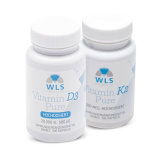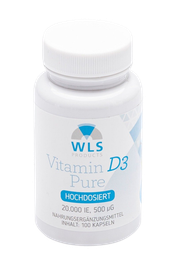WLS Vitamin D3 20.000
 Capsules
Capsules
Take your 'Vitamin Sun' with WLS Vitamin D3! Vitamin D3 is a vitamin that is produced when the skin is exposed to sunlight. Vitamin D3 also occurs in small quantities in foods such as salmon, eggs and milk.
- Delivery time 3-5 business days
- Your order is safe with Trusted Shops insurance
- Over 92,000 satisfied customers
- Vitamin Sun
- Only 1 Capsule per month
- High dosage


From Monday to Friday from 10:00 to 16:00
Send us a message via e-mail
Take your 'Vitamin Sun' with WLS Vitamin D3! Vitamin D3 is a vitamin that is produced when the skin is exposed to sunlight. Vitamin D3 also occurs in small quantities in foods such as salmon, eggs and milk.
Take your 'Vitamin Sun' with WLS Vitamin D3!
WLS Vitamin D3 20.000 IU
Vitamin D3 is a vitamin that is produced when the skin is exposed to sunlight. Vitamin D3 also occurs in small quantities in foods such as salmon, eggs and milk.
Vitamin D3 can also be included in larger amounts, for example by means of supplements.
Vitamin D3 loading dose or stoss therapy
With a so-called stoss therapy or loading doses, vitamin D3 is taken in large amounts, until the blood levels are in the ideal range. Most of our customers are aiming for an average of 50 ng / ml (125 nmol / L) to 80 ng / ml (200 nmol / L).
Maintenance dosage Vitamin D3
As a maintenance dosage our customers often take our combination capsule WLS Vitamin D3 + K2, dosage: 3.000, 5.000 or 10.000 IU + K2 (MK7) 200 mcg.
The dosage is different for each person (3.000 - 20.000+ IU per day!). The personal daily dosage depends among other things on the skin color and the body weight.
One capsule of vitamin D monthly or once every 2 weeks
If you only want to take vitamin D once a month to keep your vitamin D level in the healthy range, you can also take vitamin D3 50.000 IU.
This compares to an intake of about 1.600 IU per day. This is somewhat low. 1 capsule every 2 weeks equals 3.333 IU per day, which is a better maintenance dosage.
Always know your vitamin D blood level
Before you start a loading therapy, or even monthly vitamin D3 supplements, you need to know your blood levels.
You can have your blood values measured by your family doctor, or you can use a self-test. For instance our Cerascreen Vitamin D self-test.
Take a good look at the different units in your test results. One laboratory reports this value in nanograms per milliliter ng / ml and the other in nanomoles per liter nmol / L. The nmol / L value is higher by a factor of 2.5. Usually, the values are reported in nanograms per milliliter ng / ml.
Increased risk of vitamin D deficiency
Vitamin D deficiency is no longer only related to rickets or the occurrence of bone problems such as osteomalacia and osteoporosis. There is also a connection with muscle function and with the functioning of our immune system.
In addition, low vitamin D values are associated with an increased risk of autoimmune diseases and, for example, prostate, colon and breast cancer.
Vitamin D in muscle complaints and risk groups
Be especially alert to a vitamin D deficiency if you have unexplained muscle complaints or are at risk groups, such as the elderly, immigrants, the chronically ill, 'indoor workers', frequent users of sunscreen and patients with severe obesity.
More vitamins and minerals at WLS
Many of our customers buy Vitamin D3 together with other vitamins and minerals such as Magnesium, Melatonin, Calcium and Vitamin K2.
With a so-called stoss therapy or loading doses, vitamin D3 is taken in large amounts, until the blood levels are in the ideal range. Most of our customers are aiming for an average of 50 ng / ml (125 nmol / L) to 80 ng / ml (200 nmol / L).
Take your 'Vitamin Sun' with WLS Vitamin D3! Vitamin D3 is a vitamin that is produced when the skin is exposed to sunlight. Vitamin D3 also occurs in small quantities in foods such as salmon, eggs and milk.
Take your 'Vitamin Sun' with WLS Vitamin D3!
WLS Vitamin D3 20.000 IU
Vitamin D3 is a vitamin that is produced when the skin is exposed to sunlight. Vitamin D3 also occurs in small quantities in foods such as salmon, eggs and milk.
Vitamin D3 can also be included in larger amounts, for example by means of supplements.
Vitamin D3 loading dose or stoss therapy
With a so-called stoss therapy or loading doses, vitamin D3 is taken in large amounts, until the blood levels are in the ideal range. Most of our customers are aiming for an average of 50 ng / ml (125 nmol / L) to 80 ng / ml (200 nmol / L).
Maintenance dosage Vitamin D3
As a maintenance dosage our customers often take our combination capsule WLS Vitamin D3 + K2, dosage: 3.000, 5.000 or 10.000 IU + K2 (MK7) 200 mcg.
The dosage is different for each person (3.000 - 20.000+ IU per day!). The personal daily dosage depends among other things on the skin color and the body weight.
One capsule of vitamin D monthly or once every 2 weeks
If you only want to take vitamin D once a month to keep your vitamin D level in the healthy range, you can also take vitamin D3 50.000 IU.
This compares to an intake of about 1.600 IU per day. This is somewhat low. 1 capsule every 2 weeks equals 3.333 IU per day, which is a better maintenance dosage.
Always know your vitamin D blood level
Before you start a loading therapy, or even monthly vitamin D3 supplements, you need to know your blood levels.
You can have your blood values measured by your family doctor, or you can use a self-test. For instance our Cerascreen Vitamin D self-test.
Take a good look at the different units in your test results. One laboratory reports this value in nanograms per milliliter ng / ml and the other in nanomoles per liter nmol / L. The nmol / L value is higher by a factor of 2.5. Usually, the values are reported in nanograms per milliliter ng / ml.
Increased risk of vitamin D deficiency
Vitamin D deficiency is no longer only related to rickets or the occurrence of bone problems such as osteomalacia and osteoporosis. There is also a connection with muscle function and with the functioning of our immune system.
In addition, low vitamin D values are associated with an increased risk of autoimmune diseases and, for example, prostate, colon and breast cancer.
Vitamin D in muscle complaints and risk groups
Be especially alert to a vitamin D deficiency if you have unexplained muscle complaints or are at risk groups, such as the elderly, immigrants, the chronically ill, 'indoor workers', frequent users of sunscreen and patients with severe obesity.
More vitamins and minerals at WLS
Many of our customers buy Vitamin D3 together with other vitamins and minerals such as Magnesium, Melatonin, Calcium and Vitamin K2.
With a so-called stoss therapy or loading doses, vitamin D3 is taken in large amounts, until the blood levels are in the ideal range. Most of our customers are aiming for an average of 50 ng / ml (125 nmol / L) to 80 ng / ml (200 nmol / L).
| SKU | WDVIT20 |
|---|---|
| Best before date | 31 March 2027 |
| Intake Instructions |
Depot dosage : 1 capsule a week or as directed by your health professional. |
| Product type | Vitamin D |
| Ingestion Form | Capsules |
| Quantity / Content | 100 count |
| Quantity of vitamin D3 | 20.000 IU |
|---|---|
| Free from / suitable for | Sugar free, Fructose free, Lactose free, Gluten free, Porcine free, Vegetarian |
| Warnings | Not suitable during pregnancy and / or lactation, Not suitable for children under the age of 10 |
|---|
| SKU | WDVIT20 |
|---|---|
| Best before date | 31 March 2027 |
| Intake Instructions |
Depot dosage : 1 capsule a week or as directed by your health professional. |
| Product type | Vitamin D |
| Ingestion Form | Capsules |
| Quantity / Content | 100 count |
| Quantity of vitamin D3 | 20.000 IU |
|---|---|
| Free from / suitable for | Sugar free, Fructose free, Lactose free, Gluten free, Porcine free, Vegetarian |
| Warnings | Not suitable during pregnancy and / or lactation, Not suitable for children under the age of 10 |
|---|


From Monday to Friday from 10:00 to 16:00
Send us a message via e-mail






